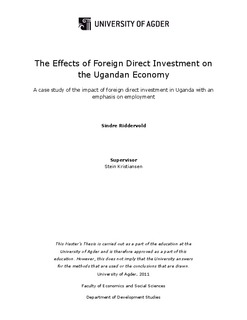| dc.description.abstract | Many developing economies have endeavored to encourage Foreign Direct Investment (FDI) in a bid to facilitate economic growth. Uganda has remained ahead of several other African economies in offering incentives and creating a favorable environment for foreign investors. In spite of the discouragement caused by the tyrannical regime of Idi Amin from 1971 to 1979, foreign investors still find Uganda a favorable place for investment. This has been enhanced by the government’s efforts to attract investors through many favorable investment policies.
Foreign Direct Investment usually has significant effects on any economy and this paper presents a case study of the effects of Foreign Direct Investment in Uganda with an emphasis on employment. It presents answers to the questions of; what the level of FDI is in Uganda, how many people are employed in the foreign companies, the type of foreign investments in the country as well as which sectors receive most investment.
However, there is a conflict in the findings of the effects of FDI in the Ugandan labor market as the gathered information varies, thus questioning the validity of the data, and the fact that there is still a need for 15 million jobs to be created, implying that FDI is not the sole solution for economic development through employment generation. Furthermore this study suggests that a range of factors need to be taken into consideration to understand the effects of FDI on the Ugandan economy. The quality of labor, standard of living, skills, human resource retaining capacity of the local market, wages, etc. determine the success of employment generation. The study concludes that additional valid primary data should be gathered to answer the research questions satisfactory as there seems to be conflicts in perspectives of its effects on local employment. Nevertheless, this study should provide a point of departure for further research on the topic. | no_NO |
